“Integrity is important in building relationships. And is the foundation upon which many other qualities for success are built, such as respect, dignity, and trust,” said author and leadership expert John C. Maxwell.
Time after time, customer relationship management has proven to be one of the most effective approaches to maximizing repeat revenue and customer loyalty over time. Good customer relationships are the common denominator of successful brands in today’s competitive market. Our customers, like us, are human — and appreciate the human aspect of a relationship when interacting with a brand.
But how can you build these effective, personal customer relationships? This blog post will take you on a masterclass of customer relationship building and management so your business can reap its many rewards. We’ll define what exactly customer relations are, explain why they’re so important, and give you actionable tips for building lasting customer relationships. We’ll also introduce monday CRM as a powerful tool to monitor and track customer relationships so they become ingrained into your business strategy.
What is customer relations?
Customer relations refer to all the different ways a company interacts with its customers as part of its effort to create and maintain a positive, lasting relationship with them.
It refers to every experience a customer has with a business, including a spectrum of activities from daily customer query responses to long-term relationship-building tactics through personalized emails. Essentially, It’s every single interaction a brand has had with a customer, encouraging the idea that each interaction contributes to a company’s overall relationship with a customer. Positive customer relations are the foundation of any successful business.
Customer service vs. customer relations
Customer service is one aspect under the broader umbrella of customer relationships. It refers to the reactive interactions taken by a company in direct response to a customer’s specific questions or issues. It generally refers to solving immediate issues rather than fostering a long-term relationship through proactive interactions (although every customer service interaction eventually becomes a part of the long-term relationship between a business and customer) and includes things like:
- Live chat support
- Support ticket
- Call centers
Proactive interactions, which don’t always fall under the customer service umbrella, refer to the interactive measures that enforce a healthy long-term relationship with customers. They can include things like:
- Emails on their birthday
- Personalized product recommendations
- Requests for customer feedback
While customer service is only one of the various types of engagement a brand will have with a customer, it’s one of the most important aspects of customer relationships because people often define a brand and their relationship with it through daily customer service interactions.
In fact, according to Salesforce research, 89% of consumers are more likely to make another purchase after a positive customer service experience.
The importance of positive customer relations
There’s a clear reason customer experience is at the forefront of so many modern conversations with leading businesses — It’s because strong customer relations drive concrete success. As consumers increasingly value trust, their experience or relationship with a brand is becoming the primary influence in purchase decisions. In fact, in a McKinzie study, polled company leaders stated that one of their top priorities is to drive a simplified customer experience. Here are some of the top benefits companies with strong customer relationships reap:
Increased customer retention
According to a Forrester study, just a 5% improvement in customer retention could increase profitability by at least 25%. There’s no doubt that it’s important to keep your customers coming back, avoiding customer churn, and the way to do that is simply to keep them happy by providing them with a good customer experience.
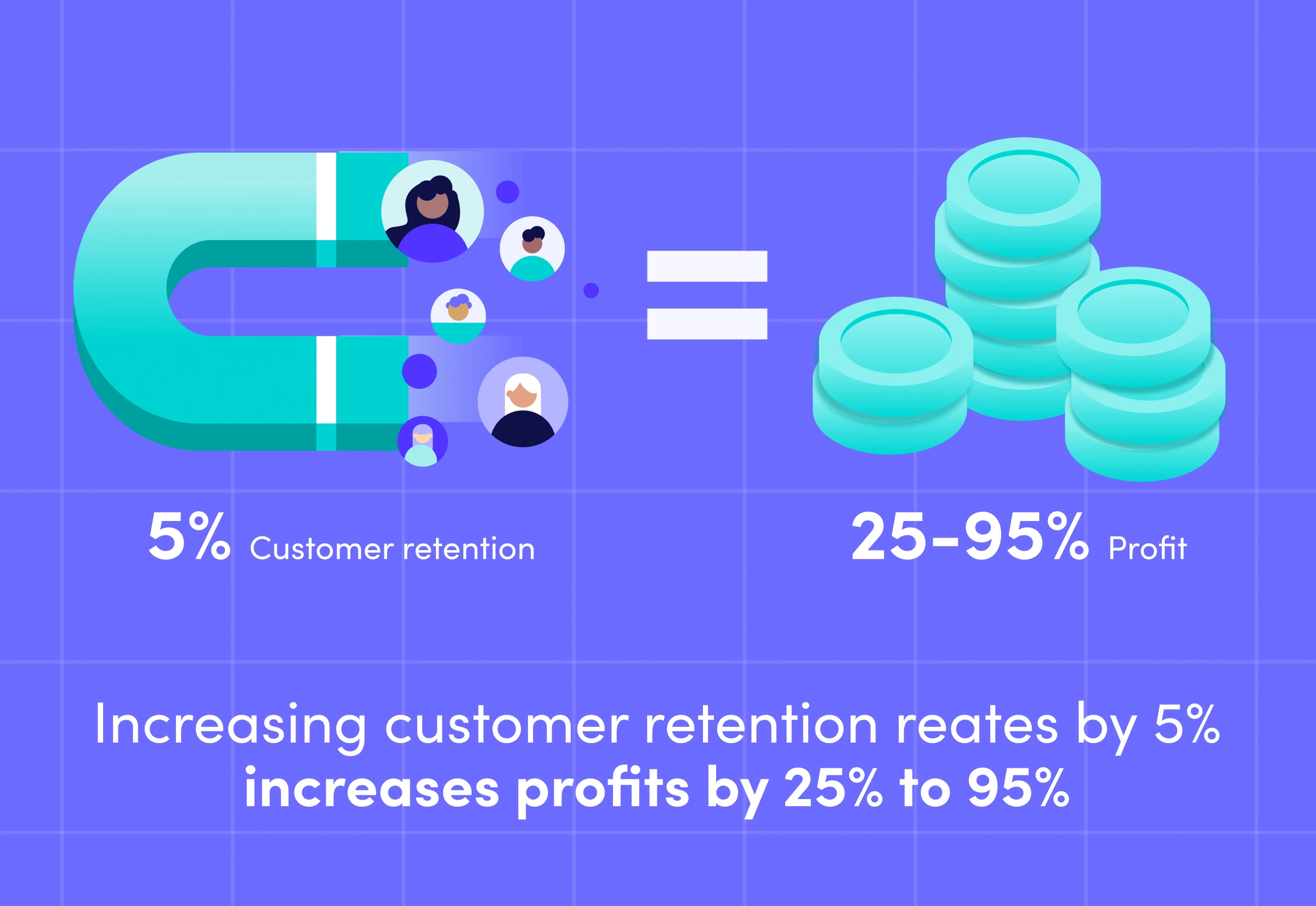
More loyal customers
There’s nothing worse than losing a customer to a competitor — from a personal standpoint, but more importantly, from a business standpoint. The good news is that the way to ensure customers are loyal is by prioritizing and personalizing your relationship with them so they’ll feel a connection to your brand. According to the Zendesk trend report, 74% of customers say they actually forgive a company for a mistake after receiving excellent customer service.
Organic brand ambassadors
Your brand’s reputation is crucial for attracting new patrons, and who better to maintain a solid reputation for your company than existing customers? People love to talk, and moreover, people today love to share their experiences online — whether in the form of a customer review or comment on a social media post. Often, these reviews or online sentiments can be the difference between turning a potential customer into a customer. Plus, Satisfied customers are often willing to recommend a brand with which they have a positive relationship—a cheap and efficient form of marketing!
Tips & methods for building positive customer relationships
It’s important to consider implementing customer relationship strategies at the forefront of any business, and the best way to do this is to ensure relationship building is a company-wide effort. We compiled some tips and best practices so teams can take action to build strong relationships.
1. Understand your customers
Any good relationship in business and life is built upon a foundation of basic human understanding. It’s vital to understand things like who your customers are, what they value, what their pain points are, and what the best channels to meet them at are — and to then create specific messaging with this research in mind. Treating them like human beings rather than just numbers will make them feel understood, and your brand will stand out because of this emotional connection you’ve fostered.
2. Provide top-notch customer service
We’ve touched upon the importance of impeccable customer service because It’s perhaps the simplest and most effective way to ensure customers have a positive customer experience. To do this, customer service should be:
- 1. Quick. Swift responses ensure customers feel heard and minimize the frustration of waiting for a representative. Prioritizing as little wait time as possible for customers has proven highly effective in creating positive company impressions.
- 2. Accessible. Omnichannel support lets customers feel they can reach someone where they want when they want. It shouldn’t be difficult for customers to reach a representative, and It’s essential to offer diverse support options such as phone calls, emails, chatbots, and social media contact.
- 3. Human. Customers want to feel like they’re genuinely connecting with someone who listens to them and cares about their needs. Treat their issues with understanding and compassion, offering customized solutions to their problems when needed, and they’ll respond well.
3. Use personalization when communicating with customers
Personalization is a surefire way to further establish your brand’s human identity so customer relationships feel more meaningful. Interactions with customers should include information about them, whether it’s referencing their name, purchase history, or preferences. A CRM is an excellent tool for storing customer data in one place, so it’s simple to pull upon it for continuous, personalized conversations.
4. Make your customers feel appreciated
Appreciation goes a long way, which is why it’s critical to go the extra mile to show appreciation for customers who stay loyal to you. The small gesture of sending an email to thank a customer for their commitment to your brand can help foster a connection and positive sentiment towards your brand. Loyalty programs are a great example of the impact of rewarding repeat customers, with a recent study indicating that customers are 85% more likely to shop from a brand with a loyalty program.
5. Invest in employee training
A company’s employees are the heart of a company — after all, they’re the ones interacting with customers, thus directly representing an entire company’s brand. Your employees must know how to interact with customers in a helpful, positive way. While it may seem self-explanatory, the best way to ensure employees are communicating in this productive manner is through training. Not only will this help your employees become better experts on your company’s messaging and values, but it will also ensure that all employees provide a consistent customer experience.
5. Ask for customer feedback and use it
Customer feedback is an invaluable tool that can give insight into improving your processes while also making customers feel heard. The simplest way to ask for feedback is to provide customer surveys and ask for input after a customer service interaction.
With a tool like a CRM, you can automatically keep track of metrics like customer lifetime value (CLV) or customer retention rates to understand what’s working with your customer experiences and where there may be room for improvement.
Why use a CRM to manage customer relationships?
Now, providing consistent, personal, and human customer interactions may feel daunting—especially if you’re dealing with a large customer base. But with the use of technology like a CRM, it actually becomes quite simple. A CRM, or customer relationship management software, is a platform that centralizes and tracks all client information and interactions in one digital place. Employees can quickly draw upon data to manage customer expectations and provide a human, personalized experience.
Using a CRM to manage customer relationships leads to:
- Centralized customer data
- Accurate customer insights
- Automation features that ensure no interaction slips through the cracks
- More efficient communication and team collaboration
monday CRM: the software to maximize customer relationships
monday CRM is the all-encompassing tool to efficiently manage all your customer relationships in one place. With all customer information centralized in one intuitive, interactive place, access to robust integrations, and custom dashboards and permissions, teams can enjoy the visibility and control over the relationships they’ve yearned for — at every part of the customer journey.
Here’s what we offer:
Holistic contact management
Get a 360° view of your customers and clients, complete with communication history, lifetime value, position in the wider sales pipeline, and more. Then, manage all interactions, emails, contact info, and related documents within the platform through social integrations.
When everything’s in one place, you take the legwork out of managing customer relationships so your team can focus on delivering an excellent experience without the hassle.
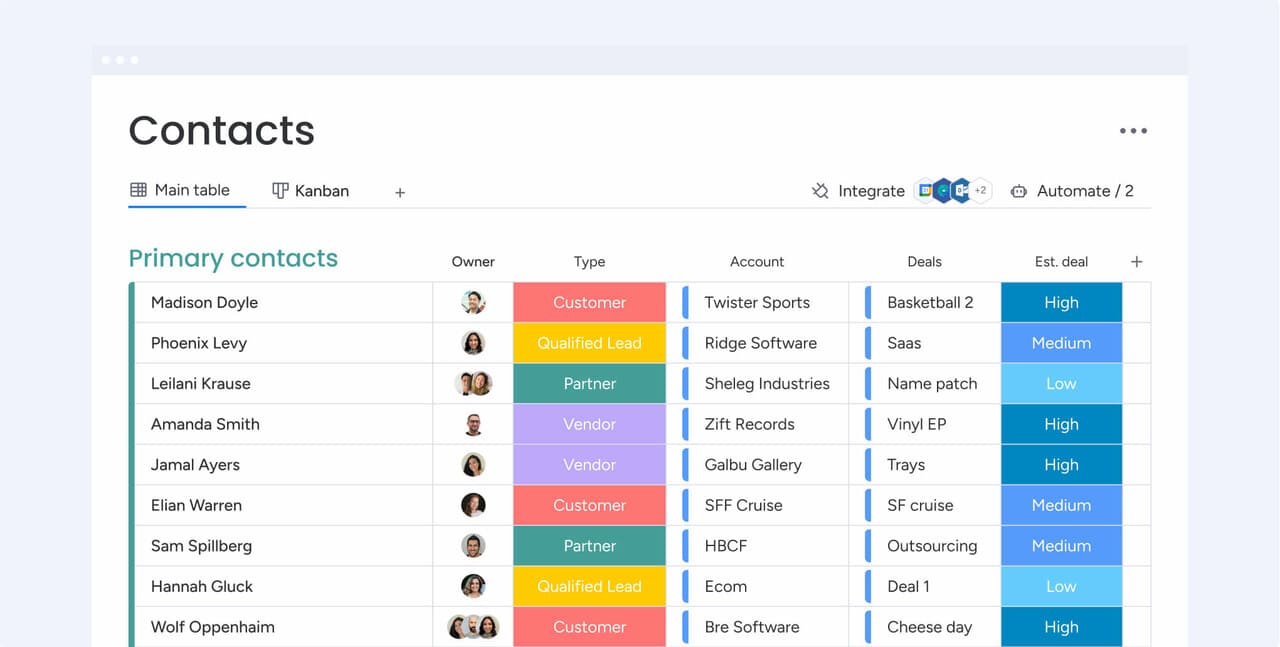
Interactive dashboards for performance tracking
Access advanced CRM software features that increase visibility, such as custom dashboards that instantly report your deal progress, sales figures, and team performance. Track and visualize specific customer success metrics such as customer satisfaction level and customer retention to understand where exactly you can take steps to improve.
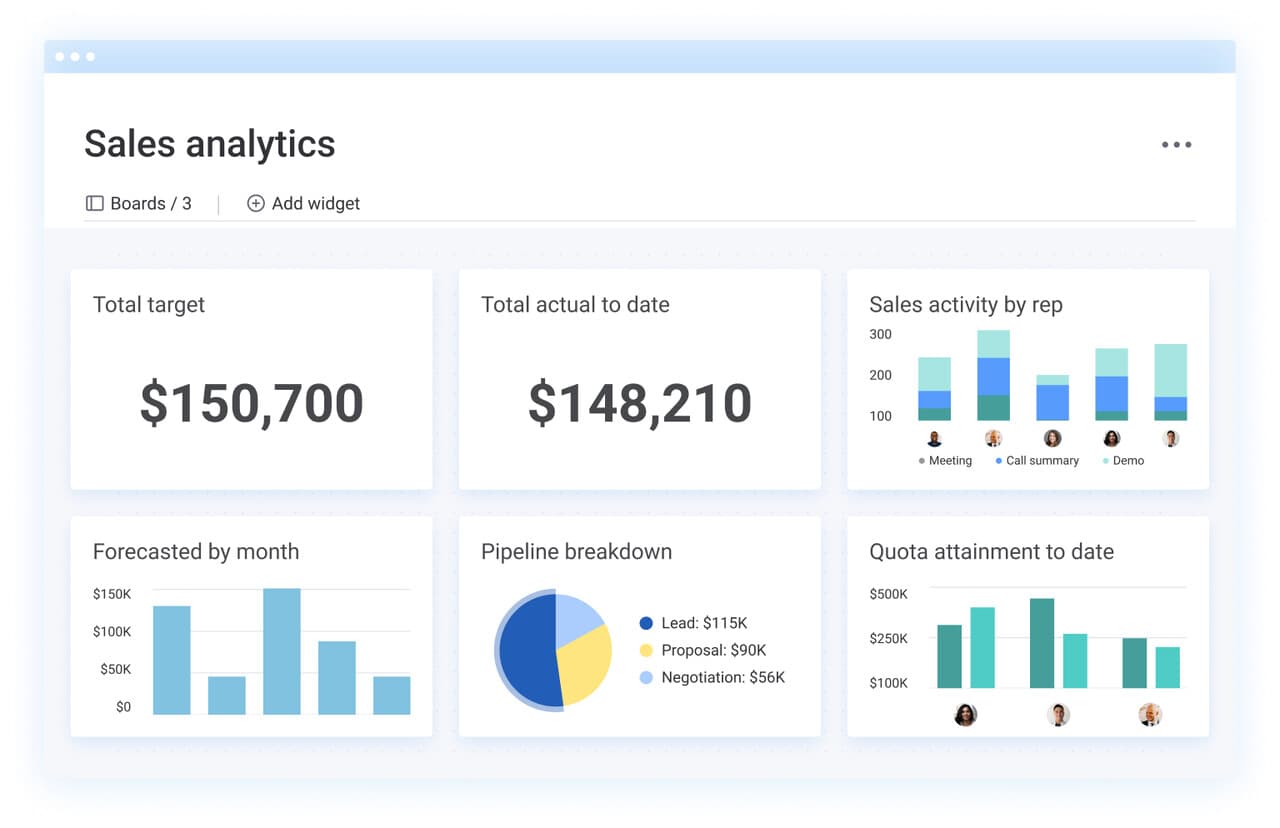
Personalization features for optimized messaging
With powerful features like personalized sequences, mass emailing & tracking, and AI email writing, teams can effectively reach contacts at every stage of the pipeline with the right message. Offer a more personalized customer experience by drawing upon things like a customer’s previous interactions with your brand.
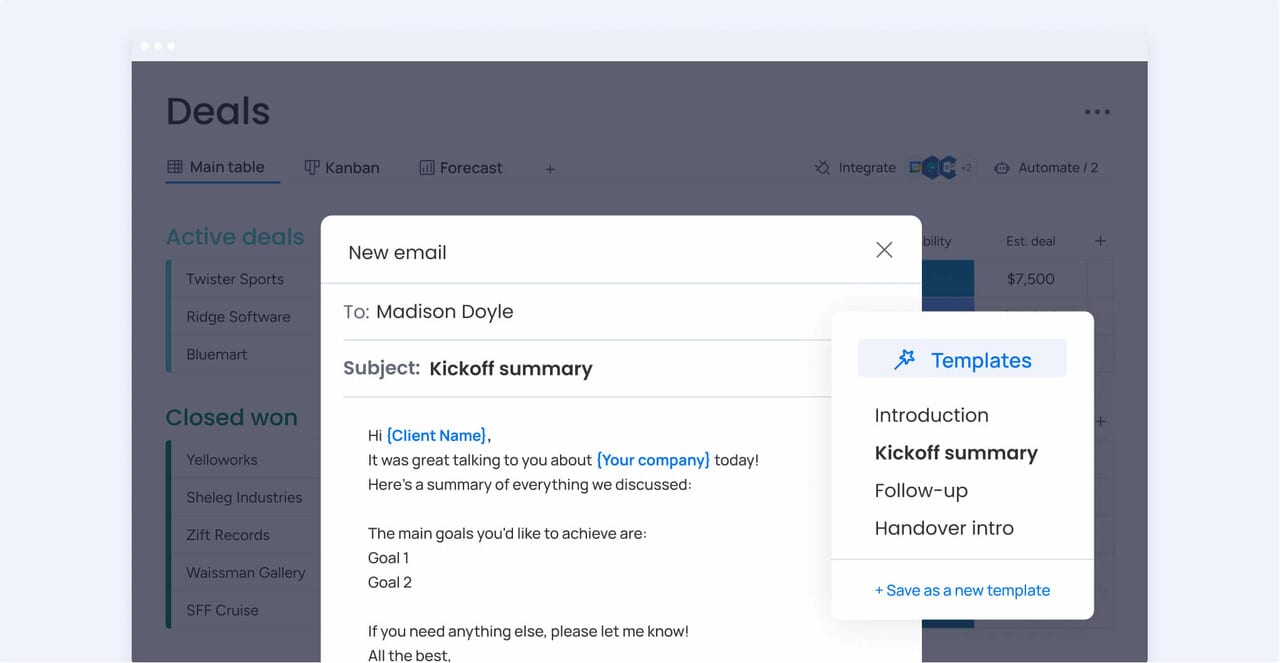
Automations to ensure timely response times
Automations allow you to set up custom actions triggered by a specified change. In building customer relationships, timely responses to queries are critical and have measurable effects on retention and loyalty behaviors.
Easily create an automation with monday CRM that reminds you to send follow-ups, respond to a lead, or send an email to a customer who hasn’t interacted with your brand in a specified amount of time.
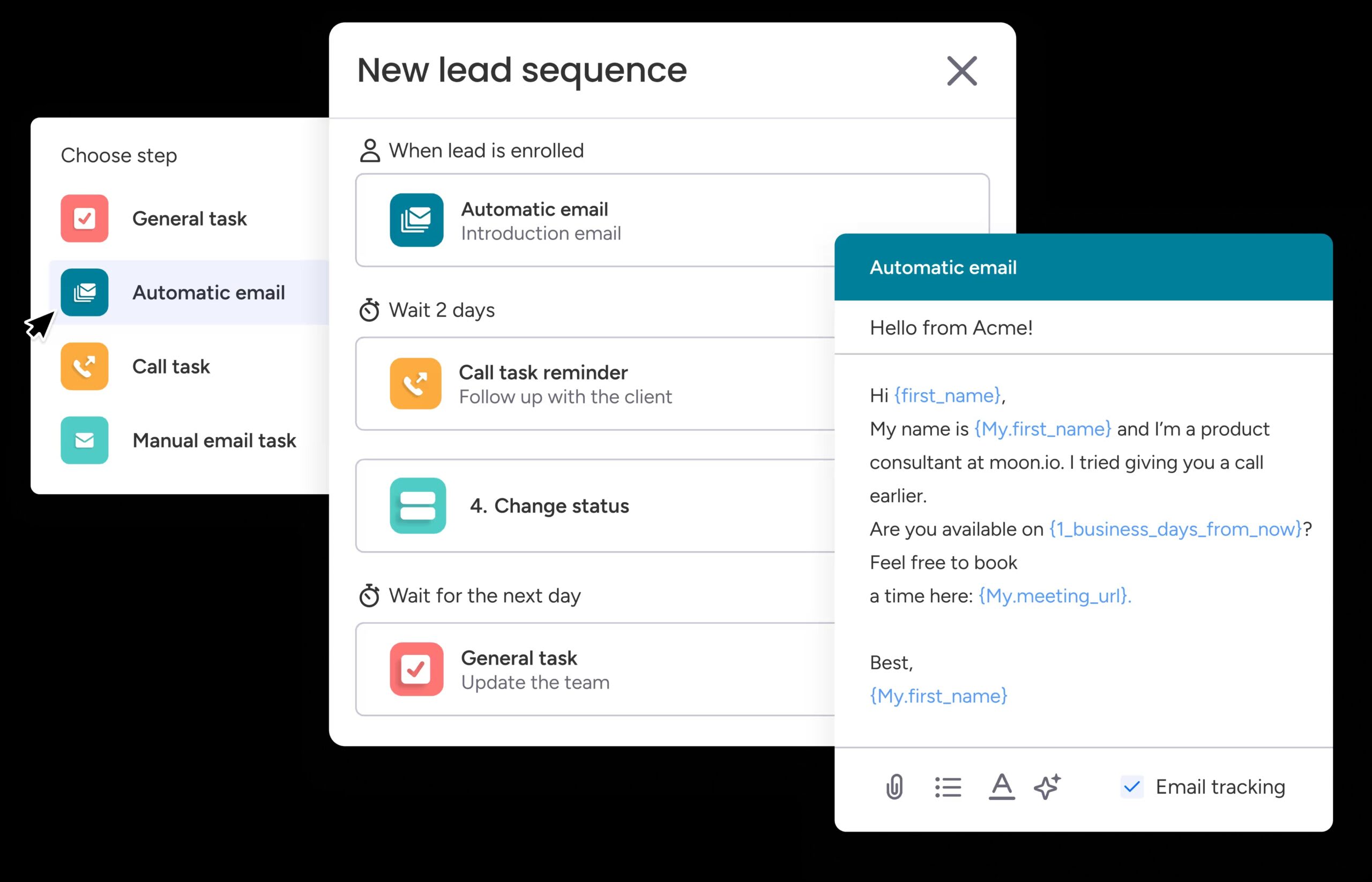
The secret weapon to establishing trust and loyalty among customers, in the simplest way possible, is a robust CRM software solution. Take the next step in building meaningful and beneficial relationships with your customers and give monday CRM a try today.
FAQs
What are the different types of customer relationships?
The types of customer relationships can be categorized into:
-Transactional relationships - relationships that only include the one interaction that leads to payment
-Self-service relationships - the types of relationships where the company doesn’t directly interact with the customer but encourages them to independently help themselves with the right resources
-Automated relationships- the use of technology to support customers through automated processes
Long-term relationship - a consistent, ongoing relationship in which the company interacts with the customer regularly
Personal assistance - the personalized, one-on-one interaction between a customer service representative and a customer
What are proactive vs reactive interactions
Proactive interactions encourage long-term relationship building, while interactive interactions are those taken in direct response to a customer's specific question or issue.
Who is responsible for creating customer relationships?
While the actions of every employee contribute to building customer relationships, the Customer Relations department specifically deals with managing and maintaining positive customer relationships. This department generally consists of the customer service team, customer representatives who deal with daily customer queries, & customer relation executives (customer relation managers) who oversee all customer interactions and create strategies for better relationship building.

